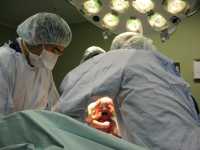MedicalResearch.com Interview with:
Ali S. Khashan, Ph.D.
Irish Centre for Fetal and Neonatal Translational Research (INFANT)
Cork, Ireland
Medical Research: What is the background for this study? What are the main findings?
Dr. Khashan: The Caesarean section rate is increasing worldwide reaching 30% in some western countries and 50% in China and Brazil. As a result, it is becoming increasingly important to understand the long-term effects this procedure may have on both mother and child. Previously, our group conducted a systematic review and meta-analysis of published literature and found birth by Caesarean to be associated with approximately 20% increased risk of autism spectrum disorder (ASD), compared to birth by vaginal delivery. This means if the risk of ASD in children born by vaginal delivery were 1%, and the association was causal, the risk of autism spectrum disorder in children born by Caesarean section is 1.2% i.e. two additional ASD cases per 1000 births. However, studies were limited, and we were unable to determine what was driving this association. In our new study, now published in JAMA Psychiatry, we investigated this issue further with the largest study on this subject to date, including all children born in Sweden between 1982 and 2010.
Our study included data on over 2.9 million people and accounted for variety of factors known to be associated with both Caesarean section and
autism spectrum disorder. After controlling for known confounders, such as maternal age and psychiatric history as well as various other perinatal and socio-demographic factors, we confirmed our previous findings that birth by Caesarean was associated with approximately 20% increased risk of autism spectrum disorder, compared to birth by vaginal delivery. However, with this analysis it remained unclear whether the increased risk was due to the Caesarean section itself, or some genetic or environmental factor that we were unable to measure.
To determine if it was birth by Caesarean section or another unknown factor which led to an increased risk of ASD, we compared children with
autism spectrum disorder to their non-diagnosed brothers and sisters. In other words, we analysed pairs of siblings in which one was diagnosed with ASD and one was not, to determine if birth by Caesarean was associated with increased risk of ASD within families. In this way, we attempted to indirectly account for genetic and family environment factors that are shared by siblings but we were unable to measure in the general population. In this analysis, which included data on over 13,000 sibling pairs, there was no longer any association between birth by Caesarean section and ASD.
Overall, these results indicate that though birth by Caesarean section may be associated with an increased risk of ASD, it is likely due to family factors such as genetics or environment, rather than the Caesarean section itself. These findings are more informative than many previous studies as we had the largest sample size on this topic to date and estimated the association between Caesarean section and the risk of autism spectrum disorder while comparing siblings born by different methods of delivery. This allowed us to control for many factors that other studies did not.
(more…)



